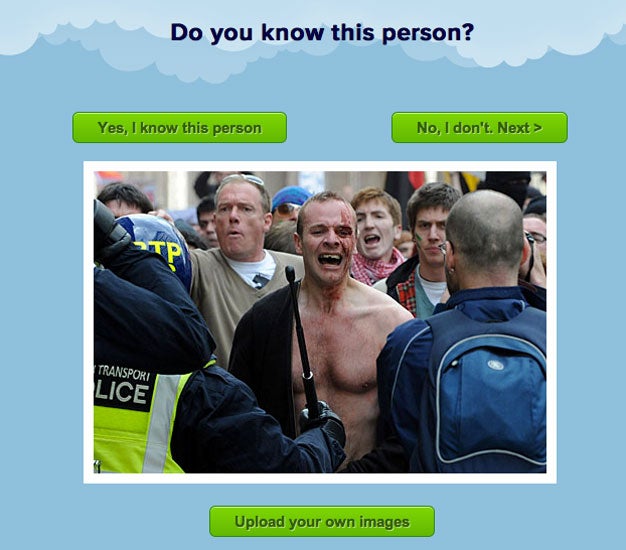Who Has Your Face In Their Photo Collection?
Facial recognition and Facebook photos are being used to track down the identities of London rioters. But the technology, now more common than ever, could just as easily be used elsewhere--anywhere

Even with economic calamity dominating the headlines here in the US, it’s impossible to escape the striking riot images currently coming out of London. For several days now, fires have been burning and shops have been getting ransacked by faceless looters. But, website LondonRioters.co.uk is trying to crowdsource the identities of the guilty parties, asking people on the web to point their digital finger at them to the authorities. But what would happen if the cops didn’t need the crowd at all?
This certainly isn’t the first time we’ve seen this kind of call for digital tattling. Earlier this year, police in Albany, New York learned the identity of some overly-rowdy college students using a YouTube video of them destroying a car. And when the city of Vancouver was sent into tumult by a hotly contested hockey series, the media was able to hunt down the exact identities of the couple involved in the “Riot Kiss” photograph in less than a day.
LondonRioters.co.uk is a simple site. Users upload images and viewers submit the names of people they recognize in the photos. It’s not a bad idea and it’s likely at least somewhat effective, but there are faults, not the least of which being that people tend to lie on the internet just about all the time. But, if you take the human element out of the equation, the whole thing can be a lot more efficient and, quite honestly, creepy.
Last week we reported that Germany has deemed Facebook’s facial recognition technology illegal because it was collecting biometric data without explicit consent from the users. One of the fears is that the company could be collecting that info into a database that could later be referenced for, well, just about anything. Sure, it would be odd if Facebook suggested friends for you based on what your other friends look like, but it would be an entirely different, and altogether more serious matter if a check against that database landed you in jail.
There are already reports of independent (some are even calling them vigilantes) groups online who are using homegrown tools built on face recognition APIs in order to track down perps and report them to the police.
Facial recognition has come a long way in the past few years. In addition to the now-old-fashioned method which measures the facial features and compares their size, shape and relative position, there are other methods like Skin Texture Analysis and even 3-D techniques that improve significantly on the results offered by the old methods. Of course, variables like funny expressions and even hats can still throw today’s tech off the trail, but that’s becoming less of a problem all the time. Even some compact cameras from companies like Panasonic are supplementing the now-common face detection with full-on facial recognition.
But that is all happening at the camera level. In fact, the London Borough of Newham has been using cameras with built-in facial recognition tech for the better part of a decade, and (according to Wikipedia) has never actually recognized a criminal.
Now the action is starting to happen after the photo is taken and uploaded to the web. Even the most basic photo-editing software, like Picasa and iPhoto can nail the identity of your contacts with surprising accuracy. IARPA has developed a tech meant for fighting terrorists, which can pinpoint the location in which a photo was taken simply by analyzing the terrain in the background.

Literally billions of personal photos hit the web every month. In fact, a report from earlier this month claimed that Flickr has reached a total of 6 billion images while Facebook is receiving an unfathomable 6 billion photos per month. A large chunk of those photos are readily available to just about anyone who wants to view them, including the authorities. And while the technology can be refined to be more accurate when guessing a person’s name from just their face, it will remain difficult to determine why the person is actually in the photos. Sure, the guy with the bandana over his face, kicking in the window probably deserves to get nailed, but what about the guys in the background of the images who may just be trying to get home?
LondonRioters.co.uk doesn’t ask “Do you know the person doing something illegal?” It simply asks “do you know the person in this photo?” An automated facial recognition system would likely ask the same question and could end up labeling everyone who was even present at the event as a rioter. That’s getting into dangerous territory. And, for every idiot that uploads a photo of himself bragging about all of the stuff he stole to Facebook (found on Reddit, picture below) there will be hundreds of other pictures populated with people who may or may not be doing anything illegal.

Down the road, facial recognition will likely be the key for all kinds of useful technologies. Replace your wallet and keys with a simple scan of your face? Great. Keeping known terrorists out of crowded areas like they currently do at major sporting events? Excellent. But, for now, let’s just hope they don’t wear a hat. Or make a funny face.
